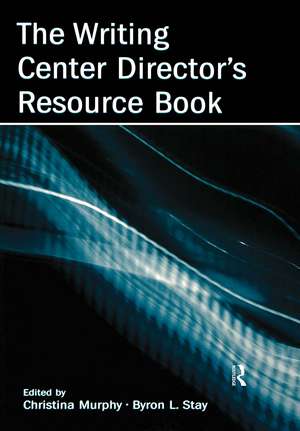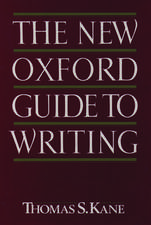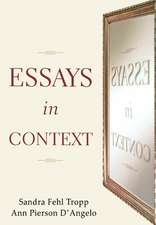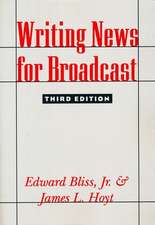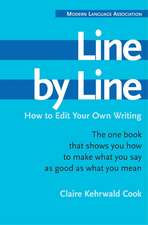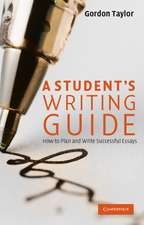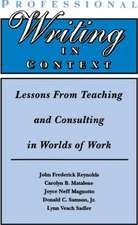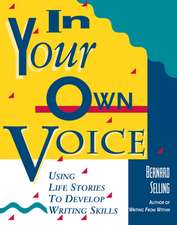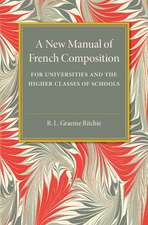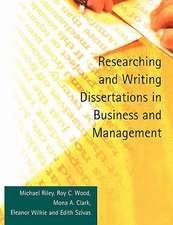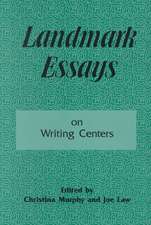The Writing Center Director's Resource Book
Editat de Christina Murphy, Byron Stayen Limba Engleză Paperback – 23 mar 2006
The volume provides information on the most significant areas of writing center work that writing center professionals--both new and seasoned--are likely to encounter. It is structured for use in diverse institutional settings, providing both current knowledge as well as case studies of specific settings that represent the types of challenges and possible outcomes writing center professionals may experience. This blend of theory with actual practice provides a multi-dimensional view of writing center work.
In the end, this book serves not only as a resource but also as a guide to future directions for the writing center, which will continue to evolve in response to a myriad of new challenges that will lie ahead.
| Toate formatele și edițiile | Preț | Express |
|---|---|---|
| Paperback (1) | 501.78 lei 6-8 săpt. | |
| Taylor & Francis – 23 mar 2006 | 501.78 lei 6-8 săpt. | |
| Hardback (1) | 1292.43 lei 6-8 săpt. | |
| Taylor & Francis – 23 mar 2006 | 1292.43 lei 6-8 săpt. |
Preț: 501.78 lei
Preț vechi: 590.33 lei
-15% Nou
Puncte Express: 753
Preț estimativ în valută:
96.01€ • 100.05$ • 79.50£
96.01€ • 100.05$ • 79.50£
Carte tipărită la comandă
Livrare economică 03-17 aprilie
Preluare comenzi: 021 569.72.76
Specificații
ISBN-13: 9780805856088
ISBN-10: 0805856080
Pagini: 472
Dimensiuni: 178 x 254 x 25 mm
Greutate: 0.8 kg
Ediția:1
Editura: Taylor & Francis
Colecția Routledge
Locul publicării:Oxford, United Kingdom
ISBN-10: 0805856080
Pagini: 472
Dimensiuni: 178 x 254 x 25 mm
Greutate: 0.8 kg
Ediția:1
Editura: Taylor & Francis
Colecția Routledge
Locul publicării:Oxford, United Kingdom
Public țintă
ProfessionalCuprins
Contents: Preface. Introduction. Part I: Writing Centers and Institutional Change. Section I: What Writing Center History Can Tell Us About Writing Center Practice. N. Lerner, Time Warp: Historical Representations of Writing Center Directors. C. Glover, Kairos and the Writing Center: Modern Perspectives on an Ancient Idea. S. Ferruci, S. DeRosa, Writing a Sustainable History: Mapping Writing Center Ethos. P. Gillespie, B. Hughes, N. Lerner, A.E. Geller, The Writing Center Summer Institute: Backgrounds, Development, Vision. R. Wallace, S.L. Wallace, Growing Our Own: Writing Centers as Historically Fertile Fields for Professional Development. Section II: Managing the Writing Center. P.B. Childers, Designing a Strategic Plan for a Writing Center. K. Lowe, "If You Fail to Plan, You Plan to Fail": Strategic Planning and Management for Writing Center Directors. M. Weaver, A Call for Racial Diversity in the Writing Center. M. Mattison, Managing the Center: The Director as Coach. B. Peters, Documentation Strategies and the Institutional Socialization of Writing Centers. L. Fitzgerald, D. Stephenson, Directors at the Center: Relationships Across Campus. Section III: Responding to Institutional Settings/Demands. A.W. Martin, The Center Has Two Faces: Developing a Writing Center in a Multicampus University Setting. C. Gardner, T. Rousculp, Open Doors: The Community College Writing Center. B.L. Stay, Writing Centers in the Small College. H. Snively, T. Freeman, C. Prentice, Writing Centers for Graduate Students. D. Paoli, Tutoring in a Remedial/Developmental Learning Context. K. Dvorak, B. Rafoth, Examining Writing Center Director-Assistant Director Relationships. A.C. DeCiccio, There's Something Happening Here: The Writing Center and Core Writing. Section IV: Writing Centers in the Administration. J. Simpson, Managing Encounters With Central Administration. B.W. Speck, Managing Up: Philosophical and Financial Perspectives for Administrative Success. J. Mullin, P. Carino, J. Nelson, K. Evertz, Administrative (Chaos) Theory: The Politics and Practices of Writing Center Location. J. Hawthorne, Approaching Assessment as if It Matters. Part II: Writing Centers and Praxis. Section I: Ethics in the Writing Center. R.M. Howard, T.H. Carrick, Activist Strategies for Textual Multiplicity: Writing Center Leadership on Plagiarism and Authorship. M.A. Pemberton, Critique or Conformity?: Ethics and Advocacy in the Writing Center. C. Murphy, On Not "Bowling Alone" in the Writing Center, or Why Peer Tutoring Is an Essential Community for Writers and for Higher Education. D. Bringhurst, Identifying Our Ethical Responsibility: A Criterion-Based Approach. Section II: Tutor Training in the Writing Center. S. Strang, Staffing a Writing Center With Professional Tutors. M. Harris, Using Tutorial Principles to Train Tutors: Practicing Our Praxis. C.P. Haviland, M. Trianosky, Tutors Speak: What Do We Want From Our Writing Center Directors? P. Gillespie, H. Kail, Crossing Thresholds: Starting a Peer Tutoring Program. B. Devet, The Good, the Bad, the Ugly of Certifying a Tutoring Program Through CRLA. Section III: Writing Centers and Electronic Instruction. D.M. Sheridan, Words, Images, Sounds: Writing Centers as Multiliteracy Centers. L.E. Bell, Preserving the Rhetorical Nature of Tutoring When Going Online. B. Click, S. Magruder, Implementing Electronic Portfolios as Part of the Writing Center: Connections, Benefits, Cautions, and Strategies. L. Hawkes, When Compassion Isn't Enough: Providing Fair and Equivalent Access to Writing Help for Students With Disabilities. Section IV: Writing Center Case Studies. P.B. Childers, Bottom Up or Top Down: A Case Study of Two Secondary School Writing Centers. K.T. Abels, The Writing Center at the University of North Carolina at Chapel Hill: A Site and Story Under Construction. M.A. Pemberton, Working With Faculty Consultants in the Writing Center: Three Guidelines and a Case History. E. Schreiber, Funding a Writing Center Through a University Line.
Descriere
For writing center directors and writing faculty, this reference offers practical, real-world content on writing centers & explores issues encountered by writing center directors at macro and micro levels.
